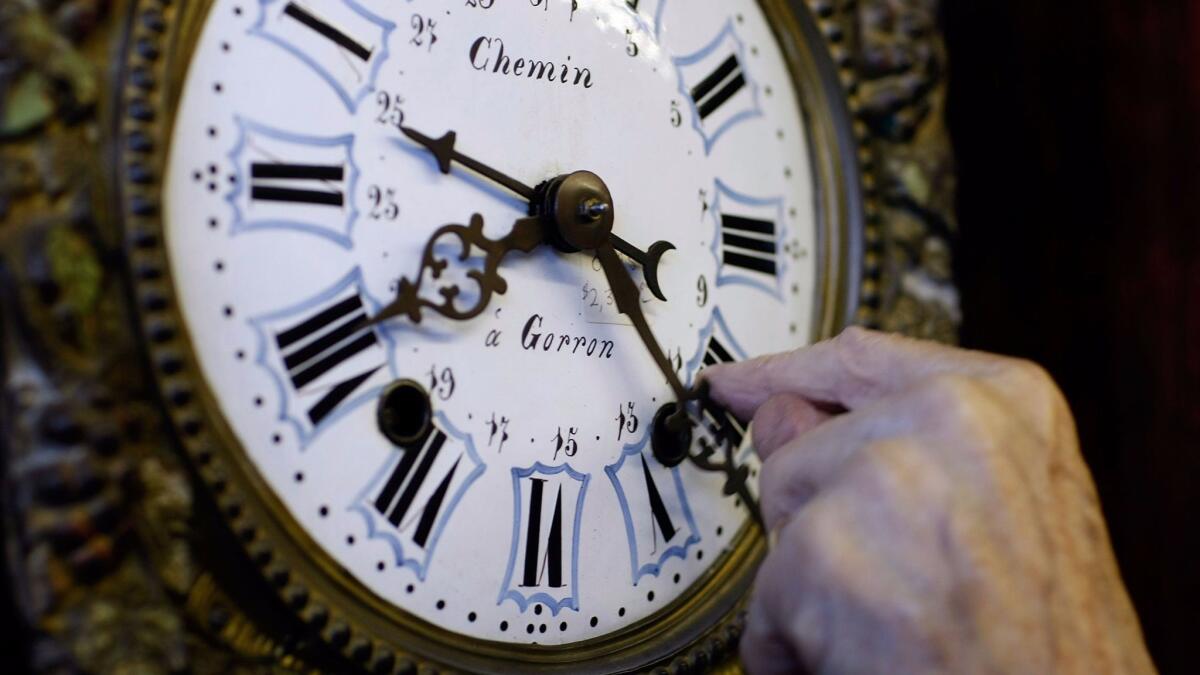Could Massachusetts lead all of New England to change time zones?

Synchronize your watches: A Massachusetts commission on Wednesday will vote on whether to recommend a switch from Eastern time to Atlantic time, potentially prompting the Massachusetts state Legislature and the rest of the region to follow suit.
Such a move — which would give the contiguous U.S. five time zones instead of four — has been widely debated across New England, which juts hundreds of miles farther east than the rest of the states in the Eastern time zone.
For the record:
5:00 a.m. Nov. 1, 2017An earlier version of this story said the vote would give the continental U.S. four time zones instead of three. There are currently four time zones in the contiguous U.S. Also the story incorrectly said the farthest-east parts of Canada use Atlantic Time. Actually, the farthest-east parts of Canada use the Newfoundland time zone.
Night falls earlier there, leaving less time for kids to play outside after school and fewer shoppers willing to go to stores after work when it’s dark.
That also makes the coming shift from daylight saving time on Nov. 5 more burdensome for New Englanders as they set their clocks another hour back. Lawmakers in Massachusetts and across the region have been looking for a solution.
Last year, Maine state Rep. Donna Bailey, a Democrat, came up with an idea.
“There’s a lot of studies showing the harm that comes from the time shift,” Bailey said. “During those winter months, we have a lot of people who suffer seasonal affective disorder, and studies have shown that just giving that extra hour in the evening, as opposed to the morning, when people are sleeping, can make a difference in lowering the rates of seasonal affective disorder.”
Bailey’s idea: A bill to cancel daylight saving time and switch Maine to Atlantic time, a time zone used by some of the farthest-east parts of Canada and by Puerto Rico and the U.S. Virgin Islands. It’s one hour ahead of Eastern time and four hours ahead of Pacific time.
“We’re already there eight months out of the year, so we might as well extend it the other four months of the year,” Bailey said.
She paused.
“Have I lost you?” Bailey said. “This is usually where people’s eyes usually glaze over.”
That’s right: Eastern daylight saving time is actually the same thing as Atlantic Standard Time.
“We are on Atlantic Standard Time at least eight months out of the year. We’re on it right now,” Bailey said.
She thought it would make sense if Maine pulled off the shift first, because the state is so far east. It would mean the extra hour of daylight at the end, rather than the beginning, of the day.
But the rest of the Legislature balked. If Maine went first, that means Patriots and Red Sox games in nearby Massachusetts would start an hour later and go later into the night, leading to lower ratings and thus lower revenue for local TV broadcasters. Not a great deal for Mainers.
Similar bills have failed to come to fruition in New Hampshire, Connecticut and Rhode Island. Vermont, alternatively, has considered asking Congress to abolish daylight saving time.
In 2016, Massachusetts’ Legislature convened a commission — the Special Commission on the Commonwealth’s Time Zone — to examine the issue. In September, the committee introduced a draft report that suggested “under certain circumstances the commonwealth could make a data-driven case for moving to the Atlantic time zone year-round.”
The commission argued that by eliminating the spring transition to daylight saving time — when the population loses an hour of sleep — “Massachusetts residents could experience fewer traffic fatalities, workplace injuries, and heart attacks, with many lives and tens of millions of dollars saved as a result.”
But like Maine, if Massachusetts makes the leap into Atlantic time, it doesn’t want to leap alone. The committee proposed a solution: The state could push for a law that stipulates that Massachusetts would adopt Atlantic Standard Time only if a majority of other New England states did it too. The state is also hoping New York might jump on board.
“I think it’s important that we not just throw up our hands and say, ‘We’ve always done it this way, we’re going to keep doing it,’ ” the commission’s chair, state Sen. Eileen Donoghue, told CBS News. “And though it’s not easy and change doesn’t come quickly, it’s something that merits further discussion.”
On Wednesday, the commission will introduce an updated proposal and then vote on whether to accept the draft as its formal position to the Massachusetts Legislature, which could help push the region toward a tipping point on the proposal.
“No one wants to be the first one to blink, I guess,” said Bailey, the Maine lawmaker. “We will be watching this commission report coming out tomorrow, like many others.”
Matt Pearce is a national reporter for The Times. Follow him on Twitter at @mattdpearce.
ALSO
Virginia tests a likely 2018 election strategy: Racially fraught appeals
Driver kills at least 8 in Manhattan in what officials say was a terrorist attack
First charges against former Trump aides reveal an aggressive strategy by Mueller
More to Read
Start your day right
Sign up for Essential California for news, features and recommendations from the L.A. Times and beyond in your inbox six days a week.
You may occasionally receive promotional content from the Los Angeles Times.







